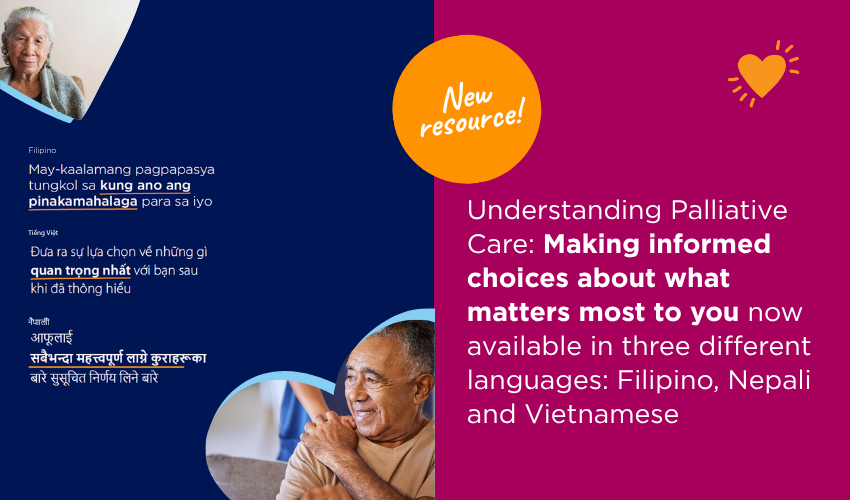In recognition of World Hospice and Palliative Care Day, celebrated annually on the 11th of October, Palliative Care NSW (PCNSW) is proud to launch new translated palliative care resources for Vietnamese, Filipino and Nepali communities in NSW. Derived from our popular Palliative Caring booklet, these new resources contain key information about palliative care and are designed to help CALD communities make informed choices about what matters most to them when diagnosed with a life-limiting illness or at end-of-life.
The 2025 theme for World Hospice and Palliative Care Day (WHPCD) is Achieving the Promise: Universal Access to Palliative Care. This builds on last year’s campaign addressing the 10-year anniversary of the World Health Assembly’s resolution on palliative care, to explore what is needed to build toward universal access to palliative care.
NSW is an extremely diverse state. According to Multicultural NSW, more than two million NSW residents were born overseas and more than 283 languages are spoken. CALD communities can face additional barriers to accessing palliative and end-of-life care, and it can be even more difficult when crucial palliative care information is not available in language. These resources aim to improve access, by providing relevant and culturally appropriate palliative care information, that is also NSW specific.
“Australia’s rich cultural diversity is one of our greatest strengths, but it also presents unique challenges in accessing healthcare including palliative and end-of-life care. For those who weren’t born in Australia and where English is a second language, navigating the system can be even more complex. We must commit to equitable, culturally inclusive care for all Australians—starting with making health information and education available in multiple languages. These resources in three new languages are helping address this need.”
— Kirsty Blades, CEO, Palliative Care NSW
These new translated resources were developed based on feedback from PCNSW members and CALD communities, and translated by the trusted SBS In Language team. The three languages, Vietnamese, Filipino and Nepali, were chosen to fill gaps in the translated palliative care resources currently available. The resources are also dual-language with the information available in-language and English. This was to address a need identified by PCNSW members and stakeholders about different language proficiencies within multigenerational families. Our members highlighted that families can become confused and distressed when health information is given to older members of the family in a language which then the children and grandchildren are unable to read or understand.
A thorough consultation process was undertaken during the development of these new resources to ensure they are accurate and easy to understand for CALD community members who may be unfamiliar with palliative care and that recognises the sensitive nature of the topic. Members of PCNSW’s CALD Communities & Palliative Care Professional Network who are familiar with the three languages were also engaged to review the translated materials and provide feedback. It was particularly important to ensure that the content remained culturally appropriate while still providing CALD communities with key information about palliative care. Some of the topics in the resource include ‘How can palliative care help me?’, ‘Carers and family’ and ‘How can I access palliative care?’.
These resources are now available to download from our website here:
Vietnamese version: https://palliativecarensw.org.au/download/understanding-palliative-care-vietnamese-resource/
Filipino version: https://palliativecarensw.org.au/download/understanding-palliative-care-filipino-resource/
Nepali version: https://palliativecarensw.org.au/download/understanding-palliative-care-nepali-resource/
If you have feedback or ideas about other languages we could focus on in the future, please email our Research and Project Coordinator: emma@palliativecarensw.org.au
These new resources have been made possible through funding from the NSW Ministry of Health.


